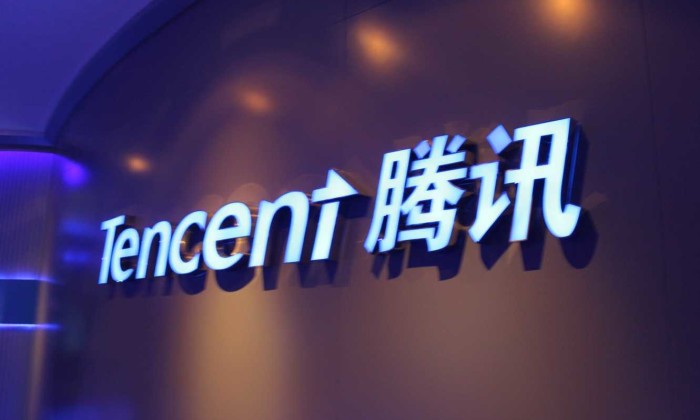In the first quarter of this year Tik Tok, an international version of Douyin that launched in late 2017,
今年第一季度,公司于2017年年末推出抖音國(guó)際版—Tik Tok,
became the world's most downloaded iPhone app, excluding games a rare feat for a Chinese social app.
成為全球下載量最多的iPhone app,除了游戲應(yīng)用外,這樣的火爆程度對(duì)于中國(guó)社交app而言,是非常罕見的。
It has done well in Indonesia and Thailand. At home it led app-store rankings from January to May.
國(guó)際版在印尼和泰國(guó)取得不錯(cuò)成績(jī)。在國(guó)內(nèi),抖音在1月至5月的app商店排行中一直領(lǐng)先。
It claims to have a user base of 300m in China, more than Kuaishou, another short-video app in which Tencent has a stake.
抖音稱其在中國(guó)擁有3億用戶,多過騰訊參股的另一個(gè)短視頻app快手。
Its appeal has prompted Communist Party outfits to set up accounts, and, on one occasion, state censors to place restrictions on it.
其吸引力也引起了一些國(guó)家部門的注意,它們也注冊(cè)了抖音賬號(hào)。
All of which has provoked Tencent into providing a "defensive product", notes Xue Yu of IDC China, a consultancy.
咨詢公司—國(guó)際數(shù)據(jù)公司的Xue Yu表示,這促使騰訊推出了一款“防御性產(chǎn)品”。
In April Tencent resuscitated its short-video app, Weishi, a year after closing it.
四月,在關(guān)閉一年后,騰訊重啟其短視頻app微視。
Its angst may stem from the fact that every firm wants "a top-of-mind app",
頭條個(gè)人投資者、硅谷創(chuàng)業(yè)學(xué)校Y Combinator的Anu Hariharan表示,
says Anu Hariharan of Y Combinator, a Silicon Valley startup school, and a personal investor in Toutiao.
騰訊的焦慮或許來源于這樣一個(gè)事實(shí)—每家公司都想要一個(gè)“人氣第一的app”。

WeChat has hardly lost its oomph. A state agency recently reported that WeChat made up 34% of China's total mobile-data traffic in 2017.
微信仍未失去其魅力。國(guó)家機(jī)構(gòu)近期報(bào)道稱,2017年,微信占中國(guó)移動(dòng)數(shù)據(jù)總流量的34%。
To advertise, Douyin still relies on users sharing its videos on WeChat's public feeds (hence its ire over the blocked videos).
為了宣傳,抖音仍需要依賴用戶在微信平臺(tái)的朋友圈中分享其視頻(所以該公司才因視頻被屏蔽而動(dòng)怒)。
Still, the share of time spent by Chinese mobile users on messaging slipped from 37% to 32% in the year to March, says QuestMobile,
QuestMobile表示,截至三月,中國(guó)移動(dòng)用戶在消息應(yīng)用上花費(fèi)的時(shí)間從37%下滑至32%,
while that spent on watching short-form video has risen from 1.5% to over 7%.
而花在觀看短視頻上的時(shí)間從1.5%增至7%。
Meanwhile, Douyin has introduced its own private-messaging function, further challenging WeChat.
同時(shí),抖音推出了私信功能,進(jìn)一步挑戰(zhàn)了微信的地位。
In May, an eassy put out on WeChat by a former tech journalist lit up social media.
五月,一名前科技新聞工作者在微信上發(fā)表的一篇文章點(diǎn)爆社交媒體。
In "Tencent Doesn't Have a Dream" he argued that the firm had become chiefly an investment firm buying up other startups and had lost its innovative edge.
在《騰訊沒有夢(mèng)想》一文中,他爭(zhēng)論稱,騰訊已經(jīng)成為了一家以投資為主的公司,收購(gòu)其他創(chuàng)業(yè)公司,失去了其創(chuàng)新優(yōu)勢(shì)。
One bit of evidence was that by the time Tencent had registered Douyin's rise, its window for a counter-attack had all but closed.
證據(jù)之一就是當(dāng)騰訊注意到抖音的火爆后,想反擊卻已沒有機(jī)會(huì)了。
The naysayer claimed his treatise drew 1m views. Still, his readers all came to WeChat.
這位唱反調(diào)的作者稱該文章瀏量為100萬。但是他的讀者均來自微信。
譯文由可可原創(chuàng),僅供學(xué)習(xí)交流使用,未經(jīng)許可請(qǐng)勿轉(zhuǎn)載。












